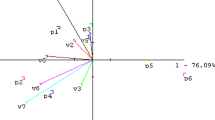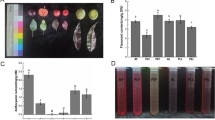Abstract
Robinson and Robinson1 investigated the anthocyanin pigments of the fruit of the blackcurrant (Ribes nigrum) and stated that the skins contained a cyanidin-3-bioside. Gyanidin was the only aglycone found; but it was thought possible that small amounts of delphinidin were present. Fouassin2 has recently examined blackcurrant pigments by paper chromatography and has found two glycosides of cyanidin and two glycosides of delphinidin.
This is a preview of subscription content, access via your institution
Access options
Subscribe to this journal
Receive 51 print issues and online access
$199.00 per year
only $3.90 per issue
Buy this article
- Purchase on Springer Link
- Instant access to full article PDF
Prices may be subject to local taxes which are calculated during checkout
Similar content being viewed by others
References
Robinson, G. M., and Robinson, R., Biochem. J., 25, 1687 (1931).
Fouassin, A., Rev. Ferment., 11, 173 (1956).
Willstäter, R., and Bolton, E., Liebig's Ann., 412, 136 (1916).
Bate-Smith, E. C., Symp. Biochem. Soc., No. 3, 62 (1950).
Bate-Smith, E. C., Biochem. J., 58, 122 (1954).
Author information
Authors and Affiliations
Rights and permissions
About this article
Cite this article
CHANDLER, B., HARPER, K. Anthocyanins in Blackcurrant Fruits. Nature 181, 131–132 (1958). https://doi.org/10.1038/181131b0
Issue Date:
DOI: https://doi.org/10.1038/181131b0
This article is cited by
-
Flavonoid glycosides and hydroxycinnamic acid esters of blackcurrants (Ribes nigrum)
Zeitschrift f�r Lebensmittel-Untersuchung und -Forschung (1977)
-
Zur Bestimmung von Anthocyanen in schwarzem Johannisbeersaft
Zeitschrift für Lebensmittel-Untersuchung und -Forschung (1967)
-
Untersuchungen �ber Anthocyane, insbesondere �ber das Malvin
Zeitschrift f�r Lebensmittel-Untersuchung und -Forschung (1963)
-
The First Anthocyanins appearing during the Ripening of Blueberries
Nature (1961)
-
Separation of Anthocyanins from Plant Extracts
Nature (1959)
Comments
By submitting a comment you agree to abide by our Terms and Community Guidelines. If you find something abusive or that does not comply with our terms or guidelines please flag it as inappropriate.



